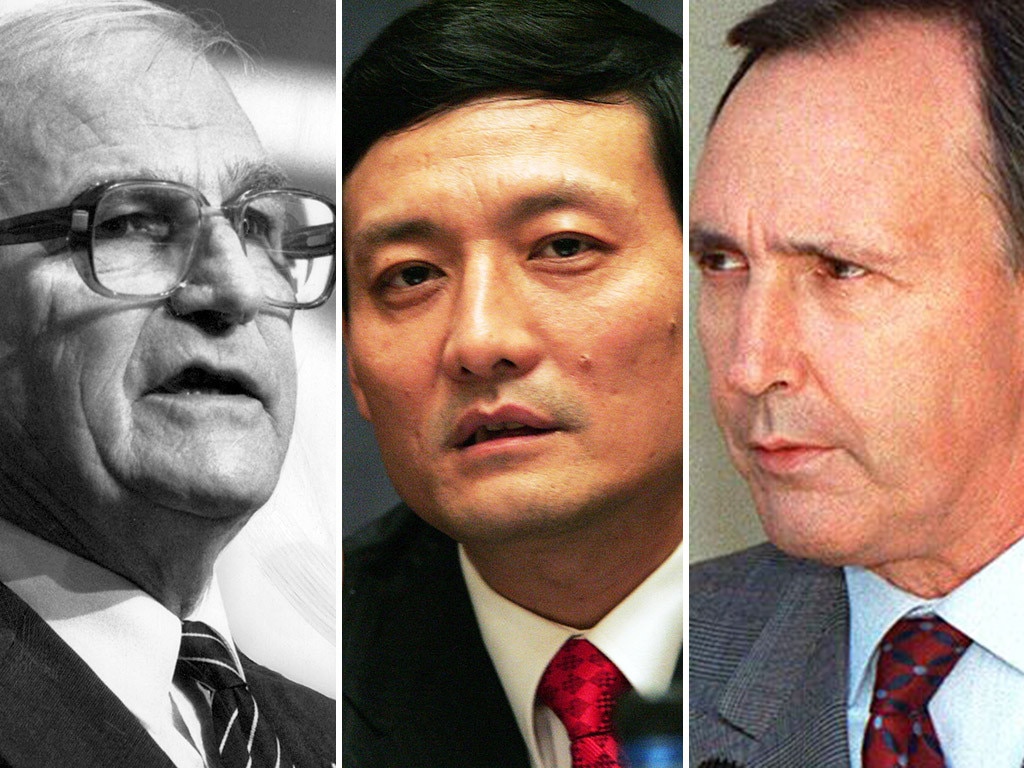Seven Group director Warwick Smith: China relations ‘never been worse’
Australia could find itself in “extreme jeopardy in a very short space of time” if China were to impose a trading embargo on Australia.

Australia could find itself in “extreme jeopardy in a very short space of time” if China were to impose a trading embargo on Australia, Seven Group Holdings director Warwick Smith has warned.
In an interview with The Australian after giving a private presentation to more than 100 business leaders hosted by the Bank of America this week, Mr Smith, who chairs the Business Council’s Leadership Group on China, said that Australia’s relations with its largest trading partner “had never been worse”.
He said Australia’s strong trading relationship with China was based on mutual interest, including China’s demand for Australia’s iron ore and coal, which was reflected in the profit results of mining companies RioTinto and Fortescue Metals this week.
“Australia’s sale of coal and iron ore are actually up this year,” he said. He said there was no possibility in the short term that China could replace its iron ore purchases from Australia with other supplies from Africa, including the Simandou mine in Guinea in western Africa.
“They can’t just switch overnight to mining in Guinea,” he said. “They need coal and iron ore from us.”
But he warned that Australia could quickly find itself in “extreme jeopardy” if China were to impose an embargo on trading with Australia.
Mr Smith, who resigned earlier this year as head of the federal government’s newly established National Foundation for Australia-China Relations, is a close adviser to Western Australian businessman Kerry Stokes, a former chairman for NSW and the ACT for the ANZ, and a former executive director of Macquarie Bank.
His comments come after China’s Ambassador to Australian, Mr Cheng Jingye, warned that Chinese consumers could stop buying Australian beef and wine and Chinese tourists and students could decide to stop coming to Australia following increasing diplomatic tensions between the two countries.
The Chinese government has warned Chinese students of the danger of “racist incidents” in Australia while the federal government recently upgraded its security warnings for Australians in mainland China and Hong Kong.
Mr Smith, a former federal government minister who comes from a Launceston-based family involved in the wool business, said business needed to let government know of the importance of Australia’s trading ties with China, which he said went well back before the days of Federation.
He said business should play a role in encouraging government to engage with China at a time when Australia’s diplomatic relations with China were “being tested”.
He said he felt that there had been progress in improving mutual understanding about China between business leaders dealing with China and key security agencies in Australia, with the establishment of the Business Council’s committee on China.
The committee has heard presentations from leaders of security agencies over the past year.
These included presentations from the chairman of the Foreign Investment Review Board, David Irvine, the head of the Australian Security Intelligence Organisation (ASIO), Mike Burgess, the director-general of the Australian Secret Intelligence Service (ASIS), Paul Symon and Defence secretary Greg Moriarty.
Mr Smith said Australia’s security and alliance relationships with the US should “not hinder” its relations with China, a completely different country, which also required “mutual respect”.
He called on the federal government to change its tone in dealing with China, dropping its rhetoric about the importance of “values” and replacing it with an approach of “principled realism”.
He said there was a danger in using the word “values” in Australia’s international diplomacy because it was seen as involving Western concepts.
He said Australia needed to take a more civil approach in dealing with China which involved “managing differences” and “respecting cultural differences”.
He said Australia needed to adopt a “principled position” when it came to dealing with China, but one that was also pragmatic.
Mr Smith welcomed the approach taken by Foreign Minister Marise Payne at the AUSMIN talks in Washington this week when she spelled out that Australia would carve out its own independent foreign policy when it came to dealing with China.
“She drew a line with the US about dealing with China which was really important,” he said.
“(US Secretary of State Mike) Pompeo was almost declaring his faith in a change of regime in China.
“It doesn’t help Australia to be totally aligned with the US.
“For Payne to use the word ‘independent’ and say we should have our own views on our relations with China is highly important.”
Mr Smith’s comments come after the chief executive of think tank China Matters, Michael Clifton, warned that many Australian business people dealing with China were too afraid to speak up about their concerns about the relationship for fear of being “slapped down”.
In a report issued this week China Matters called for the establishment of a new high-level advisory panel to the Prime Minister on China, which would include senior business leaders, former diplomats and others with China experience.
Mr Clifton, who headed up Austrade’s network in China for six years, said there was also a need for a new business body on China which took in the senior business leaders from the Business Council and the Australia China Business Council to speak out on China.
He said this was needed to balance the increasing role of defence and security forces in shaping the federal government’s policy on China, including the role of conservative think tanks like the Australian Strategic Policy Institute.
Mr Smith rejected suggestions that there was a need for a new business body on China.
He said he felt the Business Council’s committee on China had been forging closer links between business and defence and security interests, which was already being reflected in a change of tone in the federal government’s rhetoric on China, as evident in Ms Payne’s comments in Washington this week. Mr Smith’s comments come as the business community is watching the establishment of the much heralded National Foundation on Australia-China Relations, which has had a slow start this year.
The Foundation was announced by the Morrison government early last year with a budget or $44m over five years to help boost ties with China in the wake of increasing political tensions that began under the Turnbull government, with plans for it to start operation early this year.
Mr Smith resigned as chairman of the board in April, expressing his frustration at its “tortured and unspectacular start”.
He said the board was becoming an agency of the Department of Foreign Affairs and Trade and was “not the right model to address some of the longer-term objectives we have in terms of soft diplomacy with China”.
Foreign Minister Marise Payne announced in June that Pru Bennett would take over as chair of the board.





To join the conversation, please log in. Don't have an account? Register
Join the conversation, you are commenting as Logout